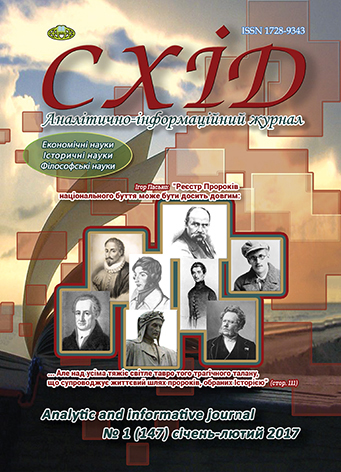Functional meaning of the phenomenon of initiation
DOI:
https://doi.org/10.21847/1728-9343.2017.1(147).97557Keywords:
rites of passage, initiation, archetype, myth, the hero's journeyAbstract
The experience the world's cultural traditions has proved that the human existence with the change of vital biological processes and social conditions subordinates to and stands at the certain step of the hierarchy. In order to achieve higher status it needs to go through the frames of the tradition of ceremonial and ritual scheme, i.e. the process of conscious mode of management and transformation of the human personality. The ceremonies of initiation served as the means of control and transformation of human personality with the help of consciousness, the encoding of the subconsciousness of inner soul of a person took place. The article deals with the different approaches in the interpretationof initiations. But the determining thing is the fact that they formalized the entrance of a person to the communal and corporate unions that were closed for the outsiders, and the essence of the process of formalization was pointed to the regulating of different variance in behavior, its unification, typification, to the development of common schemes and standards. This trend can be seen in the fact that any society, taking care of its integrity, appeals to the collective memory, uses the mythological means, develops the system of social codes (programs) of behavior that are offered to its members as ceremonies and rituals that build the basis of the axiom of cosmology of the community. The article is an attempt to define functional and semantic meaning of the phenomenon of initiation from the point of view of the theories of psychoanalysis and some myth centered ideas and conceptions. The analysis of the essential characteristics of initiation as a conscious means of management and transformation of a person's identity is developed. The characteristics of an individual's behavior from the point of view of the tradition of ceremonial and scheme has shown that the modern perspective understanding of the anthropological catastrophe is possible at the conjuncture of retrieval of a personality's integrity in the process of spiritual initiation sublimation that is the most important stage of immersion of a person in his or her own Selfness.
Downloads
References
Chistov, K.V. (1986), Folk traditions and folklore: Essays on theory, Nauka, Leningrad, 303 p. (rus).
Balushok, V. (1998), Initiations rites Ukrainian and ancient Slavic, M. Kots Publisher, Lviv - New York, 216 p.(ukr).
Toporov, V.N. (988), On the ritual: Introduction to the problematics, Archaic ritual in folklore and early literary monuments, Nauka, Moscow, 329 p. (rus).
Bayburin, A.K. (1993), Ritual in Traditional Culture: Structural and Semantic Analysis of Eastern Slavic Rites, Nauka, St. Petersburg, 240 p. (rus).
Gennep, Arnoldvan (1999), Rites of passage [Translat.] Eastern Literature, Moscow, 198 p. (rus).
Turner, V. (1988), The Anthropology of Performance, PAJ Publications, N.Y., 185 р. (eng).
Becker, R. (1990), The female initiation in magical magic. A contribution to the function and symbolism of the female aspect in the Marchen under special consideration of the figure of the Baba-Jaga, Berlin, 187 р. (germ).
Abdusamedov, A. I. & Alejnik, R. M. & Alieva, B. A. (1985), Atheistic Dictionary, Moscow, 512 р. (rus).
Bulgakov, S. (1994), The Light of the Unadorned, Respublika, Moscow, 415 p. (rus).
Balushok, V.G. (1993), Initiation of the ancient Slavs (attempted reconstruction), Ethnographic Review, № 4 (ukr).
Firsova, A.M. (2005), Socio-cultural transformation of rituals and initiation rites in the world tradition: Thesis for the degree of candidate of philosophical sciences after specialty 24.00.01: Theory and History of Culture, Nizhny Novgorod, 200 p. (rus).
Lotman, Yu. (1992), Culture and Explosion, Nauka, Moscow, 309 p. (rus).
Turner, V. (1983), Symbol and ritual [Translat.], Nauka, Moscow, 277 p. (rus).
Geertz, Clifford (1973), Interpretation of cultures: Selected Essays, Basic Books, N.Y., 470 p. (eng).
Harrison, J. E. (1908), Prolegomena to the Study of Greek Religion, Cambridge University Press, Cambridge, 682 p. (eng).
Jung, K. G. (1997), Alchemy of Dreams. Four archetypes. Mother. Spirit. Trickster. Reincarnation [Translat.], Timoshka, St. Petersburg, 352 p. (rus).
Kirilenko, G.G. and Shevtsov, E.V. (2010), Brief philosophical dictionary: 288 concepts, 156 persons, AST Publishing, Moscow, 480 p. (rus).
Jung, K. G. (1998), Analytical psychology: its theory and practice: Tavistock lectures [Translat.], BSK Publishing, St. Petersburg, 211 p. (rus).
Eliade, M. (2000), Selected works: The myth of eternal return. Images and symbols. Sacred and mundane [Translat.], Ladomir, Moskow, 414 p. (rus).
Eliade, M. (1999), Essays on Comparative Religious Studies. Selected works [Translat.], Scientific and Publishing Center Ladomir, Moscow, 488 p. (rus).
Campbell, Joseph (1997), A hero with a thousand faces, [Translat.], Sofia, Kyiv, 376 p. (rus).
Propp, V. Ya. (1986), Historical roots of the fairy tale,LeningradeStateUniversity, Leningrade, 365 p. (rus).
Ortega y Gasset, Josй (1994), Selected Works, Osnovy, Kyiv, 424 p. (ukr).
Confucius (2002), The lessons of wisdom: Works, Eksmo-Press (Moscow); Folio, (Kharkiv), 958 p. (ukr).
Mamardashvyly, M.K. (2011), Thought in culture, Consciousness and civilization. ABC Publishing, St. Petersburg, pp. 99-114 (rus).
Downloads
Published
How to Cite
Issue
Section
License
Copyright (c) 2017 Olga Kostyuk

This work is licensed under a Creative Commons Attribution-NonCommercial-NoDerivatives 4.0 International License.
1. Authors bear responsibility for the accuracy of facts, quotations, numbers and names used.
2. Manuscripts are not sent back.
3. The publisher does not always agree with the authors' opinion.
4. The authors reserve the right to authorship of the work and pass the first publication right of this work to the journal under the terms of a Creative Commons Attribution-NonCommercial-NoDerivatives 4.0 International License. This license allows others to distribute (copy) the published work for non-commercial purposes, provided there is mandatory attribution to its authors and a link to the first publication in our journal.
5. The authors have the right to conclude separate supplement agreements that relate to non-exclusive work distribution in the form in which it has been published by the journal (for example, to upload the work to the online storage of the journal or publish it as part of a monograph), provided that the reference to the first publication of the work in this journal is included.

